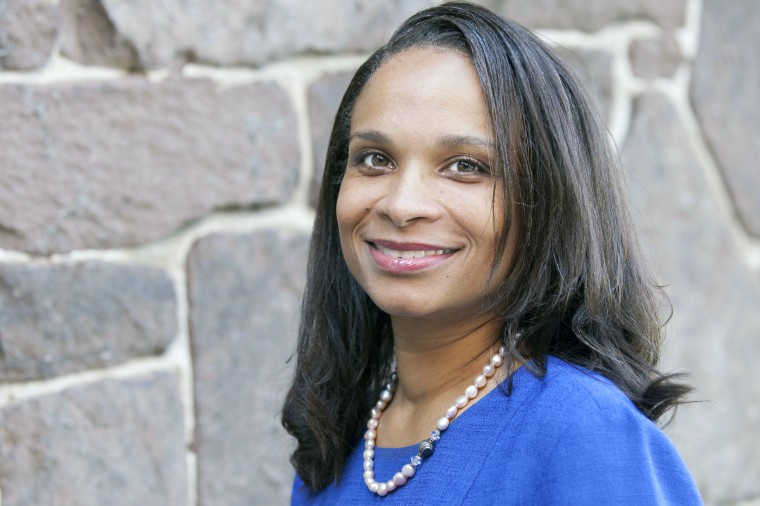Dean for Equity and Inclusion Earns a Doctorate in Education


In this Q&A we speak with Renee Johnson-Thornton, dean for equity and inclusion.
Q: Renee, when did you come to Wesleyan and what was your first position? When did you join the Office of Equity and Inclusion?
A: I was hired in 1998 to be the associate director of the Ronald E. McNair Post-Baccalaureate Achievement Program. The Office of Equity and Inclusion was established in 2013 following the hiring of Vice President Antonio Farias. Prior to his arrival, I served as dean for diversity and student engagement from 2009-2013, and the associate coordinator of the Mellon Mays Undergraduate Fellowship Program from 2000-2013. I also have held the following positions at Wesleyan: assistant dean for student academic resources from 2005-2006, and assistant to the dean of the college from 2000-2005.
Q: How would you describe your role as the dean for equity and inclusion?
A: The dean for equity and inclusion promotes access, education and compliance through collaboration with students, faculty, staff and alumni that engage the campus community in developing all students’ capacity to achieve at the highest level.
In addition, the dean provides educational opportunities that foster cross cultural competencies in order to sustain a thriving educational environment for students, especially for those from traditional marginalized communities. Those communities include students of color, students with disabilities, first-generational college students, students from different socioeconomic backgrounds, queer and transgendered students and international students.
Q: Even at an institution devoted to learning and openness, is discrimination a problem at Wesleyan?
A: Discrimination is not always a manifestation of overt acts of exclusion or violence. Acknowledging this, my office is equally vigilant and concerned about institutional practices that end up excluding someone and privileging others. The fluidity of gender and gender expression means that my office recognizes that for some people gender is neither male nor female, therefore we want to challenge our community to recognize the ways that our use of language may alienate members of our community who may feel that their identity is misrepresented or ignored all together. Our office recognizes that social identities are far more complicated than what may seem apparent.
Q: If a student feels that he or she is a victim of harassment or discrimination, what would you advise? What is the process to remedy the situation?
A: At Wesleyan, with the help of my office, we seek to challenge attitudes and behaviors that harm, and promote opportunities for community dialogue and engagement. Students are encouraged to speak with faculty, their class deans, and others to gain support and perspective on the things they experience inside and outside the classroom. Students may report incidents to the University through the incident reporting form, or they may contact any Office of Student Affairs or Office of Equity and Inclusion personnel for assistance.
In addition to investigation of harassment or discrimination, my office is dedicated to increasing the participation of underrepresented students in the sciences, technology, engineering, mathematics and other disciplines. We are particularly involved in removing barriers to success for women, racial and ethnic minorities, and students who are first generation and low income. We are constantly exploring ways to better understand the experiences students have that support or those that interfere with success and wellbeing so that we may help all students to reach their highest personal, academic and career goals.
Q: You’re also the co-coordinator of Wesleyan’s Mellon Mays Undergraduate Fellowship Program (MMUF), which is designed to encourage and support minority students to enter Ph.D. programs that prepare them for professorial careers. What is your role with the program and what are ways you and the program assists students?
A: Although I no longer hold a formal title with the MMUF Program, I remain committed to their goals. I maintain a close family bond with my dear friend and mentor Krishna Winston, who continues to coordinate the MMUF Program. In my capacity as dean for equity and inclusion, I assist in the promotion and referral of students to the range of distinguished enrichment programs and opportunities that Wesleyan offers.
Q: Where are you from, where did you attend college and what did you major in? What led you to work at Wesleyan? What do you like most about working at Wes?
A: I was born in Jamaica, West Indies and raised in Brooklyn, N.Y. I earned a BA from Binghamton University, a MALS from Wesleyan, and a Ph.D. from University of Rhode Island.
Q: What are your hobbies/interests? Anything else we should know about Renee?
A: I have a deep commitment to social and environmental justice, conservation and environmental sustainability. I enjoy facilitating diversity workshops, advising and mentoring young adults, and cultivating my spiritual and physical health.
I have dedicated my professional career to investigating the role of social learning in academic and other organizations. My interests include experiential learning, mentoring, and social learning theories. The title of my doctoral dissertation was “studying science: students gaining access to the community of practice of the environmental studies.”

